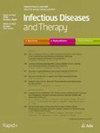Real-World Effectiveness of Ensitrelvir in Reducing Severe Outcomes in Outpatients at High Risk for COVID-19.
Abstract
Introduction: This study aimed to evaluate the effectiveness of ensitrelvir, an oral antiviral, in reducing hospitalization risk in outpatients at high-risk for severe COVID-19 during the Omicron era.
Methods: This was a retrospective study using a large Japanese health insurance claims database. It included high-risk outpatients for severe symptoms who received their first COVID-19 diagnosis between November 2022 and July 2023. The study included outpatients aged?≥?18?years. The primary endpoint was all-cause hospitalization during the 4-week period from the date of outpatient diagnosis and medication, comparing the ensitrelvir group (n?=?5177) and the no antiviral treatment group (n?=?162,133). The risk ratio and risk difference were evaluated after adjusting patient background distribution by the inverse probability of treatment weight (IPTW) method. Secondary endpoints were incidence of respiratory and heart rate monitoring, oxygen therapy, ventilator use, intensive care admission, and all-cause death.
Results: The risk ratio for all-cause hospitalization between the ensitrelvir group (n?=?167,385) and the no antiviral treatment group (n?=?167,310) after IPTW adjustment was 0.629 [95% confidence interval (CI) 0.420, 0.943]. The risk difference was -?0.291 [95% CI -?0.494, -?0.088]. The incidence of both respiratory and heart rate monitoring and oxygen therapy was lower in the ensitrelvir group. Ventilator use, intensive care admission, and all-cause death were difficult to assess because of the limited events.
Conclusions: The incidence of all-cause hospitalization was significantly lower in the ensitrelvir group than in the no antiviral treatment group, suggesting ensitrelvir is an effective treatment in patients at risk of severe COVID-19.





